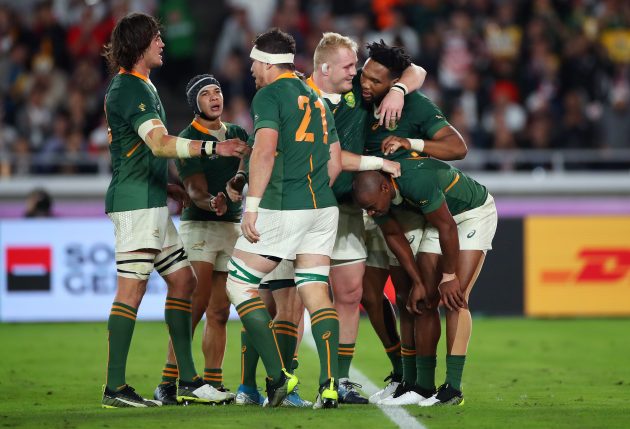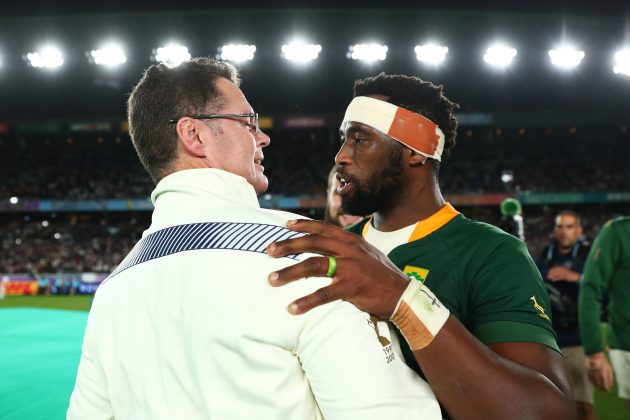Siya Kolisi and Rassie Erasmus discuss the significance of their incredible victory
Springboks win Rugby World Cup powered by the hope of a nation
In a Test match like this, pressure can build until something breaks. But listening to the Springboks immediately after their 32-12 victory over England in the Rugby World Cup final, they believe the added force needed came from “hope.”
The image of South Africa’s first black captain holding the Webb Ellis trophy aloft will rightly become an iconic one. Yet such moments come with a tax of other pressures and before the collisions and well before the celebrations, there was the expectations and the worry to deal with.
In the aftermath of the victory – based on the kind of pressure that climbs with a set-piece stranglehold and bold defence until you get two breakout tries from wings Makazole Mapimpi and Cheslin Kolbe – Springboks boss Rassie Erasmus talked about the other pressure. The context is that South Africa faced an historic moment, with Siya Kolisi potentially lifting the cup for a nation which is no stranger to tensions. That’s Siyamthanda Kolisi, from the township of Zwide, near Port Elizabeth. For South Africa, a nation battling economic crisis, corruption, unemployment at 29%; a nation yearning for a collective win.
After the match Kolisi said of his upbringing: “Growing up, I never dreamed of a day like this at all. When I was a kid all I was thinking about was getting my next meal.”
Related: Siya Kolisi’s journey from township to Test star
It’s no wonder that before the game, 2007 World Cup-winning Bok leader John Smit told the BBC: “If Siya touches that trophy on Saturday… I tell you, it will be a far greater moment than 1995 (when Nelson Mandela handed the trophy to Francois Pienaar) . Far greater. It would change the trajectory of our country.”

Scoring touch: Makazole Mapimpi scores yet again (Getty Images)
That is a potentially performance-altering level of responsibility to think about in a build up. So how, Erasmus was asked after the game, do you keep a lid on things when something so special could be coming down the pipe? Easier said than done, but, it turns out, they wanted to face things head on.
“Overall we started talking about ‘what is pressure?’” Erasmus began. “In South Africa pressure is not having a job. Pressure is one of your close relatives being murdered. In South Africa there is a lot of problems with this pressure.
“We started talking about things like that. Rugby shouldn’t be something that creates pressure on you. Rugby should be something that creates hope.
“We started talking about how we’ve got a privilege of giving people hope – not a burden of giving people hope. But hope is not talking about hope and saying you’ve got hope and tweeting a beautiful tweet, and things like that. Hope is when you play well and people watch the game on a Saturday and have a nice braai (a BBQ) and watch the game and chew food afterwards.”
? “I have never seen South Africa like this. We were playing for the people back home. We can achieve anything if we work together as one.”
Hear from @Springboks’s Siya Kolisi on what is not just a #RWCFinal win – It’s more than that ??#RWC2019 #ENGvRSA #WebbEllisCup pic.twitter.com/qgfv0STIlr
— Rugby World Cup (@rugbyworldcup) November 2, 2019
Of course, us outsiders can oversimplify or draw a cartoon of such things. And we can all ignore the rugby.
The groundwork for this win was laid in the first half, with a stifling South African display. England captain Owen Farrell admitted that the half was disappointing for the English. Tendai ‘Beast’ Mtawarira rolled back the years, giving Dan Cole – an early replacement for Kyle Sinckler – night-terrors. But the whole pack (and their legion replacements) went hard and the team defence was just as unpleasant to face for England.
Related: South Africa become No 1 in World Rankings
The English toiled in the face of it for the first 40, putting in supreme effort for undesirable results. What they saw was different from what the Boks had let us observe for most of the knockout stages. After kicking the rubber soul out of the ball against Wales and telling the world they would do the same again here, there was more movement and offloading. And a healthy dose of muscle.

Struggling to break through: Hard working England try to attack (Getty Images)
Handre Pollard and Farrell traded penalties, but the moment it started leaking away from England came at 66 minutes, with a Mapimpi try. That was the ‘snap’. England chased a clearance kick wonderfully, but the ball was worked to Mapimpi, who chipped over the top, with Lukhanyo Am collecting a passing it back to Mapimpi to score. It was a sublime effort.
Then, when Kolbe got the ball on the touchline, he send Farrell spinning from a nearly-there tackle and raced to the line, with Billy Vunipola too far away to get near him. It was comprehensive by the end.
Hope aside, Erasmus also talked about the plan that went into getting to this point, the search for consistency over the last two seasons and the circling of games on the calendar that would serve as tester Tests to show how they were progressing – a win against New Zealand in Wellington in 2018 being a prime example.
And yet… We know why we focus on the iconic moments.
Erasmus continued of what performances like this mean for the country: “No matter your political differences or your religious differences or whatever, for those 80 minutes you agree where on a lot of things you normally disagree, and you start believing in that. That’s not our responsibility, that’s our privilege.

Togetherness: The Springboks come together (Getty Images)
“The moment you see it in that way it becomes hell of a privilege and you start working towards that. I think that is the way we tackled this whole World Cup campaign.”
Erasmus explained that he also spoke to Kolisi before the jersey presentation for the game, about the emotional tightrope the skipper had to walk. Kolisi’s story is well known, but hearing it over and over again means it can lose meaning, the coach believes. Yet, he said, pointing at the trophy: “When you sit down and think about it, there was a stage when Siya didn’t have food to eat and, yes, that is the captain and he led South Africa to hold this cup and that is what Siya is.”
As for respect going the other way, Kolisi said of Erasmus’s impact that his searing honesty and open dialogue was refreshing – calling people out or praising them in a group, together, so everyone knew what was expected of them and the person next to them. He went on: “He (Erasmus) told us it has to change, the Springboks are more important than our personal goals. People lost salary to come and see us play. It changed our mindset, we cut off social media and we put heart and soul on the field. He is always honest with us. You always knew where you stood – we are really grateful.”
As the clip of that trophy getting lifted is played time and again over the years, fewer and fewer will remember what actually happened in the game. Both types of pressure will be forgotten. It is the moment that will be digitally preserved. And when replayed it should continue to feel significant.
That’s the hope.
Keep track of events in Japan via our Rugby World Cup homepage.
Don’t forget to follow Rugby World on Facebook, Twitter and Instagram.





